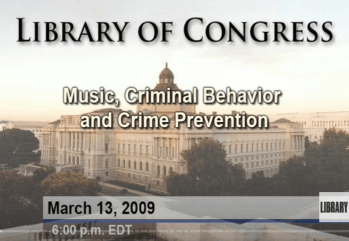
KINGDOM COME MINISTRIES INC WORLDWIDE
Electrical Pulsations of Light (Imagery) and Sound Encoded with Crime, Murder, and
Mayhem are Recorded on the Cranial Brain, the Heart Brain [1], and Permanently
Stored in the Subconscious Mind of Children, Youth, and Young Adults
Library of Congress: Music and the Brain
Criminal Behavior - Music Quells Crime
The Mar. 13, 2009 Music, Criminal Behavior, and Crime Prevention lecture, eloquently hosted by Norman Middleton, Library of Congress Music Division, is conducive to the subject matter of our position on the effect of music.
Norman and Dr. Jacqueline Helfgott, Seattle University, author of Criminal Behavior: Theories, Typologies, and Criminal Justice (2008), examine the use of classical music by law enforcement and other cultural institutions as social control, to quell and prevent crime.

Their conversation touches on how classical music is viewed in contemporary culture, how it can be a tool for discouraging criminal activity and anti-social behavior, as well as its history as a mind-altering experience.
Professor Helfgott's explanation of the criminology and science behind the various kinds and effects of music, attests to the two-edged sword of music. More specifically, its bad use for bad criminal behavior; and its good use as crime prevention.
LOC's Norman Middleton gives accounts of speaking with West Palm Beach, Florida's law enforcement detectives who acknowledged using classical music to quell drug activity; and its effectiveness. The West Palm Beach force informed Norman it had recently heard of the practice at a law enforcement seminar.
Norman also reports Tacoma, Washington, which is Dr. Jacqueline Helfgott's territory, and several other law enforcement and security entities worldwide which have used the technique, attest to its effectiveness.
In 2005 London authorities reported robberies down 33%; metro staff assaults were down 25%, vandalism down by 37%. Consequentially, London authorities expanded the use of classical music from 3 trains to 35.
